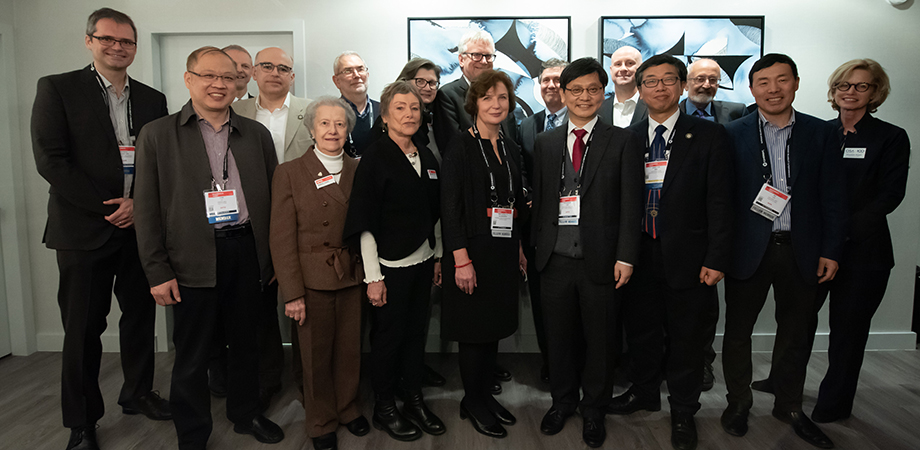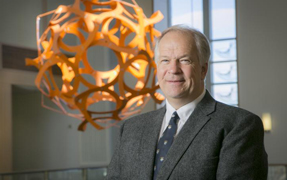Progress Includes Partnerships

In this final 2019 issue of SPIE Professional and the last quarter of my SPIE presidency, I'd like to highlight some of the many accomplishments we made this year. A key part of our effort includes collaboration and partnering to more fully achieve our mission and make a difference in the world. This year, we formed new partnerships with other organizations to leverage our mutual strengths and amplify our thoughts and ideas through our combined voices. I endeavor to give some concrete examples herein.
In the area of contractually expanded partnerships, two important examples come to mind. At the start of the year, we rolled out the BioOne Digital Library, which is built on the same platform as the SPIE Digital Library. This platform provides a very capable system that serves 15 publishers in the biology community, while our partner's contributions fund a portion of our Digital Library costs. SPIE has also benefitted from new ideas to improve our own digital platform and better serve our optics and photonics community as a result of the BioOne collaboration.
In June of this year, we announced that SPIE will acquire Xmark Media, organizer of photonics exhibitions and conferences in the United Kingdom (UK), including Photonex, the UK's largest optics and photonics exhibit. This combination will improve SPIE's service to the UK photonics community, and will allow us to provide more support to UK advocacy and industry groups working to promote our field.
In January, SPIE and the Australian Optical Society (AOS) agreed to merge two of our meetings that take place every other year in the same part of the world and at the same time. The new combined meeting is being run by SPIE for the AOS and takes on the AOS name, Australian New Zealand Conference on Optics and Photonics (ANZCOP) with SPIE and AOS conferences underneath. Topics covering biophotonics and astronomy are also being added to this event.
We also signed a new MOU with the Optical Society of Japan (OSJ) providing support for awards, leadership presence (at both OSJ and SPIE events), and agreement to find other collaborative activities of benefit to our communities. We are working on updates to similar agreements with other optical societies.
Previously developed work continued between The Optical Society (OSA), SPIE, and other groups in the areas of outreach, advocacy, and policies, such as:
- Joint SPIE/OSA Code of Conduct, which rolled out at all meetings in 2019
- OSA/SPIE Harassment Survey
- Continued multi-society support of the International Day of Light
- Continued support for the National Photonics Initiative.
- Arthur H. Guenther Congressional Fellowship
- Joseph W Goodman Book Writing Award
- Optics Education Directory
Building upon these collaborative efforts, we began a recurring "Meeting of the Optical Societies" gathering at venues where representatives of many other optics and photonics societies are in attendance. This year, SPIE hosted two such meetings with societies from around the world at SPIE Photonics West and the World of Photonics trade show. Ten societies were represented. We discussed issues from each country's perspective, shared examples of how we might help each other, and where we may collaborate. We discussed the OSA/SPIE Code of Conduct, the International Day of Light, and shared policy information that may help others. The intent is to find areas where our collective voices are aligned and can make a larger positive impact in our communities.
Lastly, leveraging upon our history of giving back to the community, we announced a $2.5 million program over the next five years to fund SPIE-named endowments such as scholarships, chairs, etc. at universities or like organizations that can match and manage these funds to provide support in perpetuity for educational purposes. The first recipient of funds from this new program was announced at SPIE Optics + Photonics 2019: The SPIE Endowed Chair in Optical Sciences at the University of Arizona (UA). SPIE donated $500,000 to the UA, which is being matched with $1.5 million from Jim Wyant (a 3:1 match), providing for this $2 million SPIE Endowed Chair of Optics and Photonics that will help fund top professors at the Wyant College of Optical Sciences in perpetuity.
As you can see we have had a very busy and fulfilling year, far beyond the usual exciting meetings, events, and publications! Still, there is much work to do and areas we need to improve. For example, we are increasing our efforts in diversity and inclusion. To show our commitment, SPIE appointed Allison Romanyshyn as Chief Inclusion Officer. This is a staff senior director position reporting directly to the SPIE CEO. However, we still need to diversify our pool of speakers, committee members, Fellows, and award nominees, and we hope to collaborate with you, our members, in this effort.

The Society is in great shape and we hope this renewed era of collaboration will better serve the broader community for many years to come.
Jim Oschmann, 2019 SPIE President
| Enjoy this article? Get similar news in your inbox |
|



